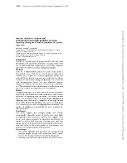Socioeconomic and health predictors for food insecurity during the COVID-19 pandemic in Czechia

Author
Vávra, Jan
The European Public Health (EPH) Conference Foundation and the European Public Health Association (EUPHA)
Publication date
2023Published in
European Journal of Public HealthPublisher / Publication place
Oxford University Press (Oxford)Volume / Issue
33 (Supplement_2)ISBN / ISSN
ISSN: 1101-1262ISBN / ISSN
eISSN: 1464-360XMetadata
Show full item recordCollections
This publication has a published version with DOI 10.1093/eurpub/ckad160.1082
Abstract
COVID-19 impacted people disproportionately and exacerbated preexisting social and health inequalities. The aim of this study was to understand how socioeconomic and health condition affected food security in Czechia during the pandemic.Methods:Data on a representative panel of Czech adults from a longitudinal survey, Life During the Pandemic collected in October 2022 as part of a Czech longitudinal survey were analyzed. Binary logistic regression as performed to evaluate whether food insecurity during the pandemic was associated with socioeconomic factors (sex, age, education, income, number of children) and health factors (BMI and comorbidity). The association between food insecurity and growing own food such as fruits and vegetables was also explored.Results:Younger people aged 20-34 years, lower education attainment, and people with underlying health condition(s) had a higher likelihood of reporting food insecurity. The lowest income group was associated with a 13 times higher likelihood of reporting food insecurity as compared to the high income group (95% CI 6.55, 27.44). Those who grew own food had a 37% decrease in the odds of reporting food insecurity. The number of children in a household was not a predictor for food insecurity.Conclusions:Our study suggests that younger people and socially, economically vulnerable groups of people were more likely to experience food insecurity. Policies that support these groups and reduce inequality in education and income are needed to reduce food insecurity. Growing own food may reduce impacts of food insecurity. Encouraging people to grow own food either in their own garden or in allotments may prepare us for unprecedented food insecurity.
Keywords
socioeconomic inequality, health, food insecurity, COVID-19, pandemic, Czechia
Permanent link
https://hdl.handle.net/20.500.14178/2826License
Full text of this result is licensed under: Creative Commons Uveďte původ-Neužívejte dílo komerčně 4.0 International




